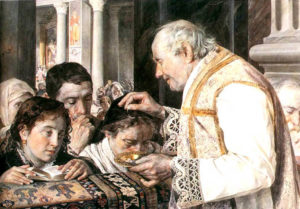Today is Ash Wednesday. It is first day of Lent. The ceremony of putting blessed ashes on the foreheads of the faithful originated from the practice of the early Church, which she took up from the example of the Ninivites, recommended by our Blessed Saviour.
 In the primitive ages of the Church at the beginning of Lent the Bishop or his Penitentiary used to cast ashes upon sinners, who came in sackcloth to the church to perform their penance, in hopes of being reconciled and absolved at the end of Lent. The ceremony is now practised towards all the faithful, because it is a time of penance for all, without exception.
In the primitive ages of the Church at the beginning of Lent the Bishop or his Penitentiary used to cast ashes upon sinners, who came in sackcloth to the church to perform their penance, in hopes of being reconciled and absolved at the end of Lent. The ceremony is now practised towards all the faithful, because it is a time of penance for all, without exception.
These ashes were from last year’s Blessed Pamls. In ancient times, palms were used as trophies of the ancient Olympic Games. By burning them, the Church wants us to forget our past victories. We must move on to new victories, to new conquests by dying to our old, sinful self so that we can put on the new man, Our Lord Jesus Christ. Only by sharing in His passion and death that we can hope to have a share in the triumph and glory of His resurrection.
 While blessing the ashes, the priest in the name of the Church begs for all her children the remission of their sins, and to that end the spirit of compunction and grace to employ as they ought the time of Lent in doing penance. During the blessing, and when getting them on our foreheads, we should join our prayers with those of the Church, and beg a contrite and humble heart — represented by the ashes — and that wholesome fear of God’s judgments (which is the beginning of wisdom) and the grace of penance. The priest signs our foreheads with the ashes in the form of a cross, and reminds us of the sentence pronounced by Almighty God upon Adam and his posterity: ‘Dust thou art, and unto dust thou shalt return.’ Gen. (3. 19) In using these words the Church intends to excite her children to penance from the consideration of death, which is the punishment of sin. consequently, we should be firmly convinced that the only true wisdom is to disengage our affections from earthly things, to love and fear God, to keep His commandments, and by doing penance to prepare for death. We shall find this easy if we frequently think on the certainly of death, the uncertainty of its time, and the eternal consequences of the condition of soul in which that moment will find us.
While blessing the ashes, the priest in the name of the Church begs for all her children the remission of their sins, and to that end the spirit of compunction and grace to employ as they ought the time of Lent in doing penance. During the blessing, and when getting them on our foreheads, we should join our prayers with those of the Church, and beg a contrite and humble heart — represented by the ashes — and that wholesome fear of God’s judgments (which is the beginning of wisdom) and the grace of penance. The priest signs our foreheads with the ashes in the form of a cross, and reminds us of the sentence pronounced by Almighty God upon Adam and his posterity: ‘Dust thou art, and unto dust thou shalt return.’ Gen. (3. 19) In using these words the Church intends to excite her children to penance from the consideration of death, which is the punishment of sin. consequently, we should be firmly convinced that the only true wisdom is to disengage our affections from earthly things, to love and fear God, to keep His commandments, and by doing penance to prepare for death. We shall find this easy if we frequently think on the certainly of death, the uncertainty of its time, and the eternal consequences of the condition of soul in which that moment will find us.
During Mass we ought to pray that God would be pleased to preserve these sentiments in our hearts during Lent and for the remainder of our lives.
Save
Save


